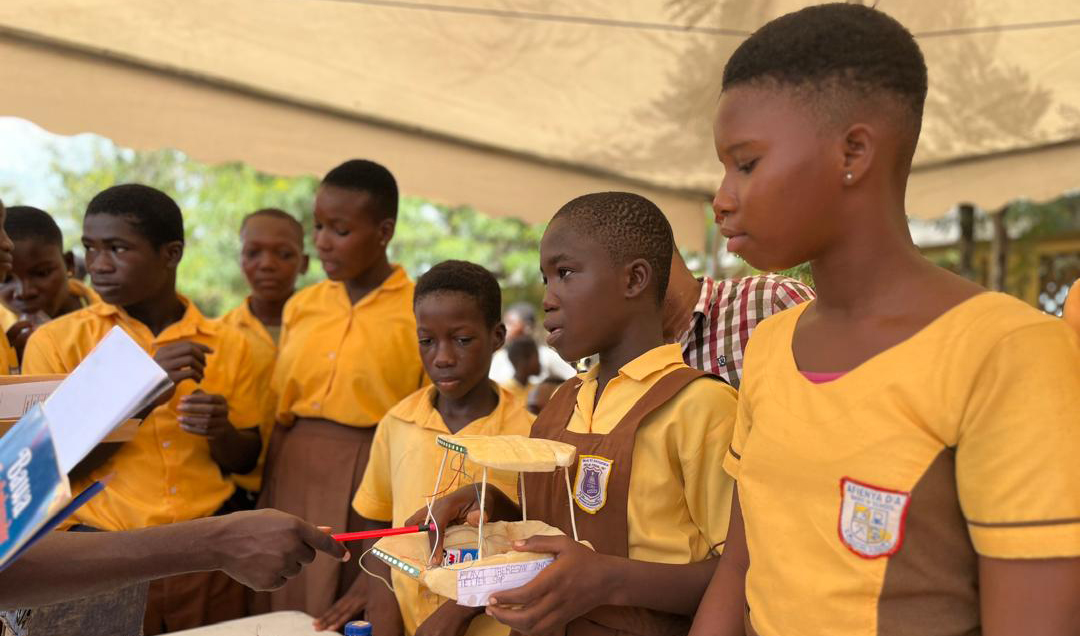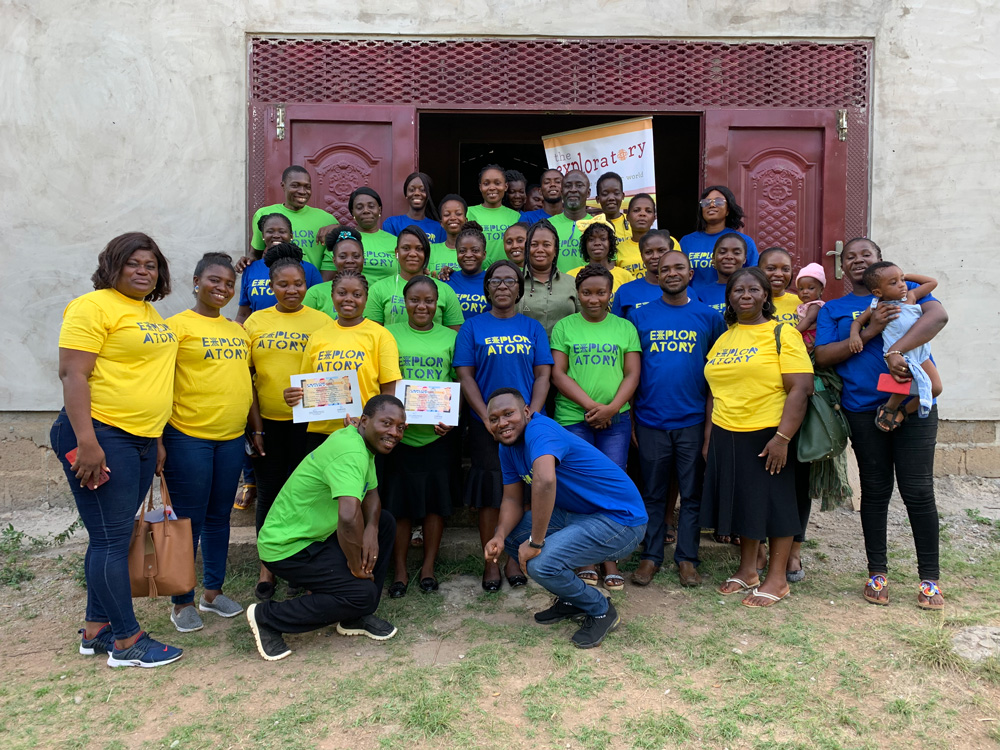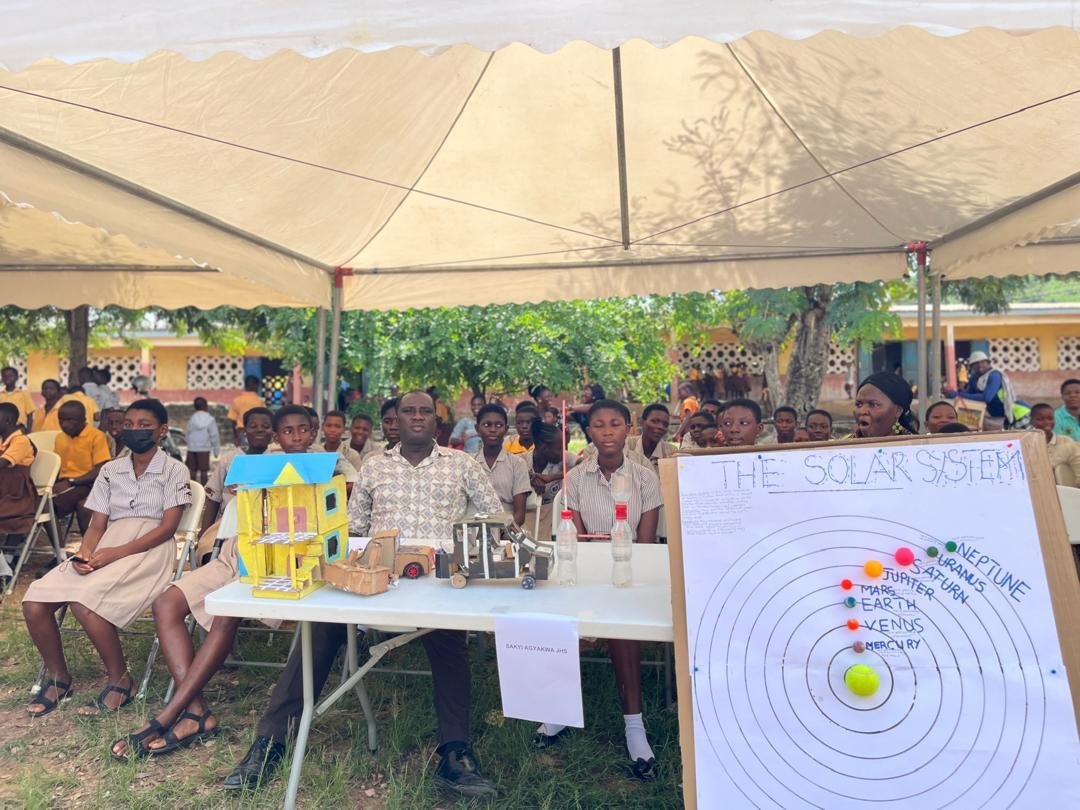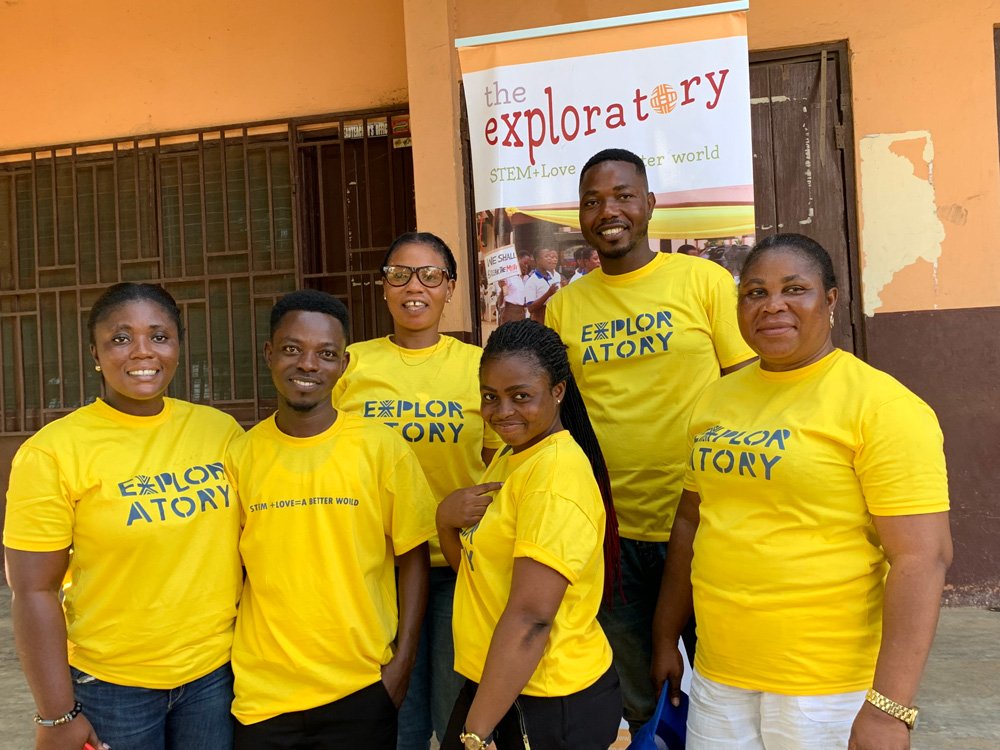The Exploratory became an autonomous NGO in Ghana in August, 2016
The Exploratory seeks to empower communities and students (mostly girls) by transforming rote learning and teaching within and beyond the classroom. We enhance quality education by inspiring students through STEM and ICT, engage teachers in quality teaching and learning and nurturing future leaders that are conversant in science, technology, engineering, mathematics, ICT and more.

In rural communities in Ghana, public schools lack resources and teachers lack up-to-date training, to make teaching and learning of STEM effective and interesting. Additionally, girls are often discouraged from pursuing STEM related courses because of expectations related to their gender and other academic myths. A fundamental leveling force in society is access to education; and in this increasingly technological world, where solutions to many social problems have a basis in science, technology, engineering and mathematics (STEM) and where public policy requires a rudimentary understanding of STEM; having access to practical STEM education, to develop STEM literacy in the broadest sense, is essential for participation in civic life and in both the micro and macro economy.

Mission
The Exploratory seeks to empower communities and students by transforming rote learning and teaching within and beyond the classroom.
What We Do
Exploratory engages in five flagship programs that seek to arrive at the vision and goals of its existence. These are;
01 Teacher Training and Workshops
Our workshops empower teachers to design responsive, engaging learning experiences and to expand their repertoire of hands-on learning assets. At our annual workshop, teachers review STEM concepts, practice creativity, teamwork and curiosity that they will model. Over 500 teachers from 100 schools have been trained in hands-on STEM activities based on Exploratory developed curriculum so far.
02 Exploratory STEM Clubs
Exploratory provides students an opportunity to experience the excitement of hands-on science, develop their team- and questioning skills, and build each other’s confidence. Teachers also have a chance to practice their teaching skills and become more familiar with the teaching and learning materials. Clubs run throughout the academic year. Sessions are held weekly with up to 90 minutes per session, Total sessions per term range between 8 and12 times depending on each school’s calendar. Exploratory clubs conduct curriculum based experiments in STEM and ICT during weekly meetings and incorporate materials provided.
03 Community Engagement Programs
It nurtures students to develop critical thinking abilities to identify and create awareness of societal problems through advocacies, sensitization and campaigns. Students are empowered to share what they learn with their peers and the community as a means of bridging the gap between the classroom and the community. They are also groomed to take lead roles in championing the solution of such problems, thereby creating community heroes and heroines.
04 Exploratory Kits
We provide several topic-specific STEM kits consisting of locally available, and/or low-cost materials, along with a curriculum, to trained teachers, for use in the Exploratory Clubs and their classrooms.
05 The Exploratory STEM Hubs
The Hubs consist of a delivery system, a learning resource library, tinkering spaces, and training facilities, to connect schools with materials, learners with local experts, and rural communities with the world. Our STEM Center at Koforidua is an ultramodern STEM facility equipped with tools and materials to make science enjoyable, practical and collaborative. The Center offers a range of services including but not limited to: STEM training for teachers, STEM training for schools, After-school STEM classes, Workspace for prototype building, Sale of STEM and educational materials, coaching on project development and consultancy services.
Our Approach
Teacher Training and Support
Training helps teachers become sensitive to the learning environments and redesign them to become STEM literates. We empower them to identify other resources in their community; to form peer learning groups; to come up with their own devices etc. Their curiosity, learning and enthusiasm will positively impact the learning of their students. By introducing various active learning techniques to teachers, and letting them practice them in clubs, they go beyond the “sage on the stage”, didactic form of teaching, to one where small group work, guiding questions, and discussion, etc are encouraged.


Our Approach
Exploratory STEM Clubs
Clubs allow students to experience hands-on learning, familiarity with the physical world, and give them greater confidence in their ability to understand STEM. Having teachers who are sensitive to their needs, and having students work in small group environments allow them to ask and answer questions safely and to check in with each other. They support each other and gain confidence in their academic ability and are motivated to try harder. Club activities also include Role Model Visits, Design Challenge, Community Engagement, Field Trips to observe real life applications of STEM. These activities promote students’ awareness of, and interest in careers in STEM and beyond, thereby increasing their aspirations.
Our Approach
Connecting Students and Teachers with STEM Resources
By introducing teachers to hands-on and digital learning materials, they themselves become more engaged, and have the means to tie practical learning with the theoretical. We have a well-equipped STEM Center where teachers and students get the opportunity to learn and explore basic and advanced STEM concepts through hands-on activities.

Special Programs
We innovate to empower students across the country
Design Challenge
Design Challenges, dubbed ‘#Solve4Ghana Design Challenge provides the avenue for students to be challenged at the end of the academic year to design solutions using locally available resources. This opportunity bridges the disconnect that exists between the classroom and the community. Students get the chance to apply their ‘wild and unconventional’ ideas after their experience from their classroom and Club sessions to build prototypes of their solutions to community and national problems and present them to a panel of judges for assessments. This mini science festival attracts audiences far and wide and from various fields to learn and appreciate the works and innovations of the students. The Design Challenge is held to climax the academic year. Prices are awarded to winning contestants and their respective schools. Highly promising students are also given bursaries and other supports to spur them to achieve more while underperforming students are also encouraged and motivated to also work hard to achieve success the following year.

Field Trips
During the course of the academic year, our explorers embark on excursions to STEM driven institutions. Field trips connect students to STEM in the real world. It gives them first-hand understanding of processes and concepts and their applications. It gives our explorers enough avenues to understand the ideas and operations of these institutions.

Role Model Visits
It is one of the strategic initiatives by the Exploratory to expose basic school children to various career fields related to science. Through the program, the students get to experience ‘one-on-one’ interactions with seasoned professionals from varying professions in the field of science. During this period, the Role Models interact with the students through their background, opportunities, challenges and ways to overcome such challenges as the students decide to pursue their career goals in STEM. Three Role Model Visits are held in each academic year.
